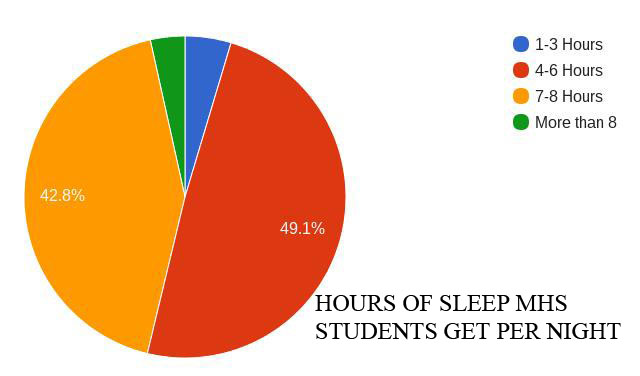Schools Should Have a Later Start Time
Many students do not get the preferred amount of sleep at night.
April 24, 2020
In Screenagers NEXT CHAPTER, the documentary discussed how teenagers are not getting enough sleep. The film mentioned the role phones play in students’ lack of sleep. Despite studies showing teens need 8-10 hours of sleep a night, only about 15% of students get 8.5 hours of sleep on a school night while 75.4% get less than 8 hours and 43% get 6 or fewer hours of sleep. Rather than blaming cell phones for teenagers not getting enough sleep, schools should start to consider a later start time for students.
The average start time of schools in the United States is 7:59, and the start time has gotten earlier throughout the years. The start time of schools interferes with teenagers’ biological clock. Due to shifts in the sleep-wake cycle, adolescents get there best sleep between 11 pm and 8 am. Most teens fall asleep at 11 pm, meaning they are unable to get 9 hours of sleep when they have to be at school before 8 am. School start times disrupt the natural sleep cycle of adolescents and 87% of high schoolers don’t get the recommended amount of sleep on a school night. A lack of sleep leads to about 20-30% of high schoolers falling asleep during school, and 27% of all drowsy-driving related car crashes involved drivers ranging from 16 to 19 years old. In fact, about 10% of teens report that they’ve fallen asleep while driving. When drivers operate a vehicle after one sleepless night, it’s equivalent to driving with a blood-alcohol level above the legal intoxication level. By having an early start time for high school, when 32% of students drive themselves, students are put at a greater risk of getting into a car accident.
Furthermore, sleep is critical for a student’s academic performance levels. Dr. Lawrence Epstein states that when students get six hours or less a night for two weeks, they perform at the same level as someone who went without sleep for 48 hours. When students improve their sleep, they do better with memory as well as motor tasks. A lack of sleep can lead to a decline in attention, and students with sleeping disorders are more likely to receive poor grades. After Seattle Public Schools pushed back the start time for high school, the school found that when the start time was pushed back, students did 4.5% better in a biology course compared to students who took the class when the start time was earlier. When the start time was pushed back, tardies in addition to absences for the first class decreased. In a school system where administrators aim to improve test scores to increase funding, it seems as though schools should push back start times to allow students to sleep longer and improve their academic performance.
Later start times should be implemented as a way to keep students safer while driving and will allow students to get the proper amount of sleep in some cases. Furthermore, later start times can improve attendance as well as the academic performance of students. Schools should examine the benefits of later start times, and begin to implement them.
The following articles were used as sources of information for this article, will provide further reading for those who are interested.
https://www.theatlantic.com/education/archive/2018/09/school-day-sleep-workday/570658/
https://www.startschoollater.net/wake-up-calls-fast-facts.html
https://www.healthline.com/health-news/pushing-back-school-help-teens-get-homework-done


